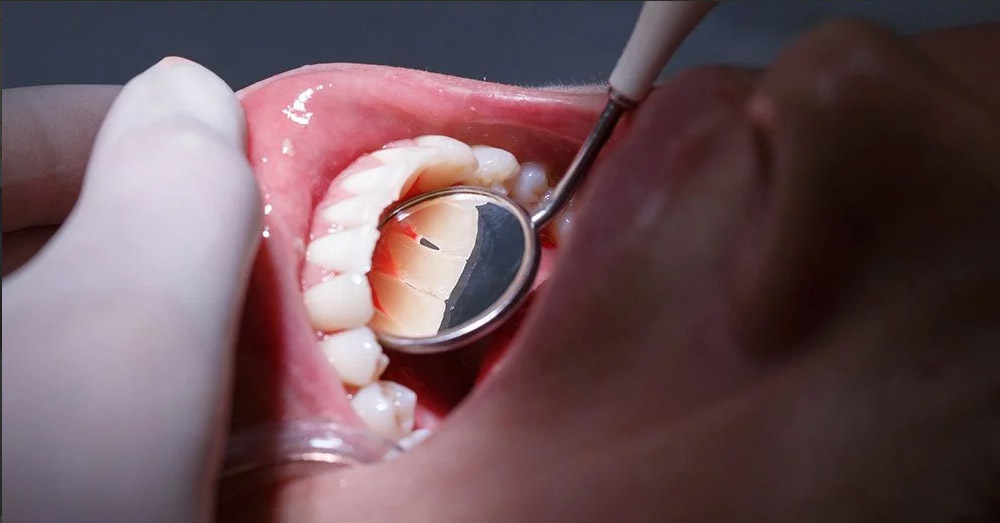Against gingivitis: US researchers may have found a new and effective treatment for gingivitis. The gel developed by them blocks a specific receptor in the oral mucosa and thereby stops the inflammatory processes. The team reported that in tests, applying this gel to mice prevented inflammation and bone loss, as well as the growth of periodontitis-promoting oral bacteria.
Gum disease, technically gingivitis, is a widespread disease: nearly half of all people develop gingivitis over time. If it persists, periodontitis can, in extreme cases, lead to jawbone atrophy and tooth loss. Chronic periodontitis is also suspected cancerand cardiovascular disease and even Alzheimer I’m up.
The problem: In severe cases of periodontitis, even antibiotics and good oral hygiene can only contain the inflammation temporarily. “So far, there is no treatment that prevents inflammation and bone loss, and it also normalizes the disturbed oral flora,” says lead author Yuqi Guo of New York University.
Succinate as an anti-inflammatory
But this could change in the future. Because Guo and his team discovered a new way to treat intractable periodontitis. The starting point was the observation that periodontal patients often showed significantly increased levels of succinate in periodontal pockets. This metabolite is released from both gingival tissues and oral flora and is suspected of promoting gingivitis and pathological imbalances in the oral flora.
Therefore, Guo and his team first looked at cell cultures and mice that trigger the physiological reactions caused by succinate. They discovered that a specific receptor on oral mucosal cells plays a critical role: if they deactivated this docking point, called SUCNR1, by genetic blockade, the mice did not develop bone loss despite the same high glucose levels, and periodontitis was also lower. unit.
Prevents blockage of receptors and periodontitis
This was also confirmed in another test: if the researchers also administered succinate to their mice, the periodontal disease in the control mice worsened. On the other hand, in animals with blocked succinate receptors, there were no negative effects: “SUCNR1-KO mice were resistant to succinate administration and showed as little bone loss as healthy control animals,” according to Gu and his team. .
Oral flora also remained ‘more normal’ in these mice: while pathogenic bacteria from the Bacteroidetes and Saccharibacteria groups are more common in periodontitis, this was not the case in mice with succinate receptor blockade. “These results strongly suggest that activation of succinate receptors promotes the onset of periodontitis,” the researchers say. On the other hand, blocking SUCNR1 significantly reduces susceptibility to periodontitis.

Active ingredient gel has triple positive effect
Based on these results, scientists have developed a gel that can be easily applied to the gums, and its active components also block succinate receptors. In tests on mice and human cell cultures, this gel also proved effective: mice that received this gel every day developed significantly less local and systemic inflammation, and bone loss in the jaw was significantly reduced.
Similar to the genetic blockade of succinate receptors, the blocking gel also had a positive effect on the oral flora: the proportion of pathogenic microbes and bacterial infections decreased sharply within a few days. “The gel alters the microbial community by regulating inflammation,” explains Guo Fellow Deepak Saxena.
We hope to cure the new periodontitis
According to the research team, their active ingredient gel opens up a promising opportunity to fight intractable gingivitis more effectively than before. “The blockade of succinate receptors by this novel agent has clear therapeutic value in combating gingivitis in a more targeted and simple way than before,” says co-first author Shen Li of New York University.
The scientists now plan to conduct more animal testing to find out the best doses and durations of treatment. Its long-term goal is to improve the gel so that everyone can use it at home in a weaker form. Dentists can insert a stronger dose into the periodontal pockets in cases of acute periodontitis. However, it will still be some time before that happens. (Cell Reports, 2022; doi: 10.1016/j.celrep.2022.111389)
Source: New York University

“Alcohol buff. Troublemaker. Introvert. Student. Social media lover. Web ninja. Bacon fan. Reader.”







More Stories
Newly appointed Science, Research and Innovation Council
Asparagus with Salmon and Avocado: A slightly different asparagus dish
Intelligence and Alzheimer's disease: How fit is your brain? Your eyes guide her